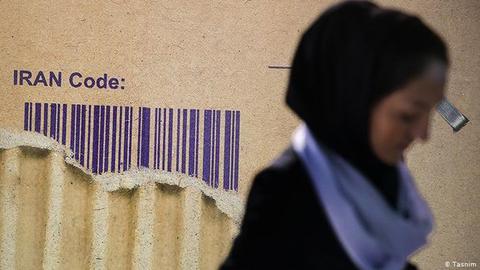In Iran, as in many other countries of the world, women routinely face discrimination, particularly in the workplace. They rarely hold senior or top positions in companies or organizations, although their hard work and talents support and facilitate the achievements of policymakers and business leaders, and they don't get any of the credit.
Women and minority groups continue to be held back by this glass ceiling, well-established obstacles so many societies have erected over centuries. Put simply, it prevents them from advancing to positions of power and decision-making in society, regardless of their intelligence, education, determination and skill. In the Islamic Republic the problem is endemic, made worse by pervasive, deeply-entrenched gender stereotypes, assumptions and prejudices.
Results of one recent academic study reveals that, of the total number of working women in Iran, only 17 percent have been able to progress to managerial positions.
In its latest issue, the quarterly journal Management Research in Iran looks at the problem in depth. “The Glass Ceiling for Women: Perceptions and Explorations" examines the root cause of women's inability to aspire to the top jobs in both private and public sectors in Iran. This glass ceiling affect is more pronounced in government agencies than it is in the private sector.
The study looks at the obstacles barring women's advancement, as well as the views and perspectives of government experts and senior managers.
The report finds that these senior executives tend to view women as having less skill or talent. They said they believed women prioritized family over work and demanded flexible work conditions, adding that they were bound by “geographical dependence on men in terms of where they live.”
"Society's view of the role of women is traditional and it believes that women should be employed in certain occupations only,” one of the professional men interviewed said.
The Political Landscape
The study looked at women’s perceived difficulty in dealing with “politics” — but while this did in some cases refer to Iran’s political and governmental systems, it also referred to the routine politics in the workplace. Those consulted for the review said women’s lack of skill or experience in these kind of political environments made it less easy for them to forge close ties to networks of power and influence.
They claimed that women were reticent to pursue their career goals if they had to resort to political tactics to do it. This included, they said, identifying and directly holding colleagues and staff to account, forging strong allies, praising colleagues, and setting up incentives for colleagues and staff.
The negative views expressed by these experts suggest that the discrimination so endemic in Iranian work culture is only being reinforced; there appears to little attempt to move on from stereotypical views of women and their abilities.
“Fragile Women in the Workplace”
"Women are not able to withstand the psychological pressures of managerial careers," some of the men the study interviewed said, adding that since women were sensitive, stressful environments and some of the toughest industries were not suitable for women — the oil industry was one area they raised specifically. Some of them suggested that women would only be able to handle the stress of high-profile jobs if they adopted and cultivated masculine characteristics.
Such attitudes stem from gender stereotypes that present a narrow version of how women and men behave that rarely seem to be challenged or updated. The gender division of labor is one consequence of this, and it obviously has a very real impact on women’s career prospects.
Women Put Family First
Several of those interviewed pointed to the problem of traditional female roles: wife and mother. They said the two roles reduce productivity and commitment, and increase employee latency and absenteeism, and led to a tendency for women to leave work more easily than men.
A lack of support for women in the workplace, often accompanied by blatant disrespect for them and a lack of job opportunities, makes women’s advancement in the world of work close to impossible.
"Women have less work experience than men, and they often have vertical careers, meaning they don't have the opportunity to gain different experiences and skills," several of the interviewees said.
Women “Dependent on Men” and Even Hostile to Other Women
According to the interviewees, geography plays a role in limiting women’s career success too, and more often that not, where they live (and work) is determined by men.
But these (largely male) experts also said they had observed an unwillingness for women to help each other out in the workplace. There was a real failure, they said, for female managers to help fellow women advance to positions of management too.
The study spoke to women business experts too, and several of them confirmed what their male counterparts said when it came to women helping women. Even though many of these successful women have firsthand experience of enormous hardship in climbing the career ladder, they are not always willing to help women going through the same experience after them. This, successful business women said, meant there was little chance of that glass ceiling being broken or dismantled.
The research conducted by the Management Research in Iran journal found that female employees at lower levels have a much more positive attitude towards growth and promotion, while female managers show less desire and willingness to provide for these women at the top.
In addition, the study revealed there was only a small number of organizational guides or plans available to help train female managers. This, coupled with a lack of willingness on men’s part to coach women for managerial positions put women at a great disadvantage when pursuing their career paths.
A Second Study
Another quarterly entitled Women and Society also published recent analysis on women in the workplace. Its article “Personal and institutional deterrents underlying the glass ceiling preventing women’s promotions in organizations” echoes the findings of Management Research in Iran.
The report said many CEOs have working styles that do not invite participation from staff, and particularly from women, and says that men are reluctant to listen to or trust women, and these two factors, plus middle managers' lack of support for women, have all paid an important role in preventing women from holding senior organizational positions.
The report says obstacles include organizations’ application of patriarchal views when devising a working structure and backing it up with policy, fewer opportunities for women, and businesses' failure to help women plan their careers.
Like the previous study, the Women and Society research also singled out women’s attitudes to family as being a driving factor in whether a woman advanced in the workplace or not. Instead of discussion about prioritizing family, the report highlighted the levels of pressures on women and their various responsibilities, chiefly as a mother and homemaker. Lack of support from family was all highlighted.
The report also pointed to the endemic discrimination women faced, and the perpetuation of misconceptions and myths about them, both physically and mentally.
Both reports — despite their clear biases — draw the same conclusion: that women in Iran have endured years of discrimination in the workplace, bolstered by a firm tradition of patriarchy and upholding stereotypes and made worse, in many cases, by outright misogyny. And the two pieces of research provide little hope, giving no signs that career paths will become any clearer or easy to navigate.
Related Coverage:
Women are the Victims of Iran’s Economic Crisis
Iran's Women are Valued Half of Men Even Before They are Born
New Report on Iranian Women and Work Reveals Rise in Unemployment and Discrimination
visit the accountability section
In this section of Iran Wire, you can contact the officials and launch your campaign for various problems



























comments